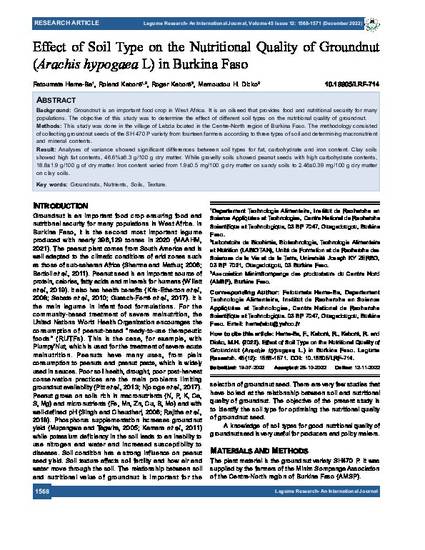
Article
Effect of Soil Type on the Nutritional Quality of Groundnut (Arachis hypogaea L) in Burkina Faso
Legume Research- An International Journal
(2022)
Abstract
Background: Groundnut is an important food crop in West Africa. It is an oilseed that provides food and nutritional security for many populations. The objective of this study was to determine the effect of different soil types on the nutritional quality of groundnut. Methods: This study was done in the village of Lebda located in the Centre-North region of Burkina Faso. The methodology consisted of collecting groundnut seeds of the SH 470 P variety from fourteen farmers according to three types of soil and determining macronutrient and mineral contents. Result: Analyses of variance showed significant differences between soil types for fat, carbohydrate and iron content. Clay soils showed high fat contents, 46.6%±6.3 g/100 g dry matter. While gravelly soils showed peanut seeds with high carbohydrate contents, 18.8±1.9 g/100 g of dry matter. Iron content varied from 1.9±0.5 mg/100 g dry matter on sandy soils to 2.46±0.39 mg/100 g dry matter on clay soils.
Keywords
- Groundnuts,
- Nutrients,
- Soils,
- Texture.
Disciplines
Publication Date
Winter December 24, 2022
DOI
10.18805/LRF-714
Citation Information
Fatouma Ba-Hama, Roland KABORE, Roger Kaboré and Mamoudou H. DICKO. "Effect of Soil Type on the Nutritional Quality of Groundnut (Arachis hypogaea L) in Burkina Faso" Legume Research- An International Journal Vol. 45 Iss. 12 (2022) p. 1568 - 1571 Available at: http://works.bepress.com/dicko/150/
Creative Commons license

This work is licensed under a Creative Commons CC_BY-SA International License.
